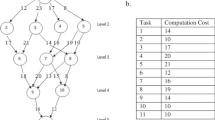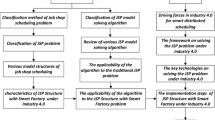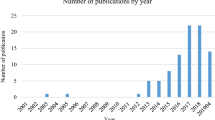Abstract
This paper presents a new kind of scheduling solution for jobs in networked manufacturing environments. The main contributions of this study can be focused on three points: The first is to distinguish the concepts and requirements of job scheduling in the networked manufacturing environment form those in the traditional manufacturing environment. The second is to construct a game-theory mathematical model to deal with this new job scheduling problem. In this presented mathematical model, this new job scheduling problem is formulated as an N-person non-cooperative game with complete information. The players correspond to the jobs submitted, respectively, by related customers and the payoff of each job is defined as its makespan. Each player has a set of strategies which correspond to the feasible geographical distributive machines. Therefore, obtaining the optimal scheduling results is determined by the Nash equilibrium (NE) point of this game. In order to find the NE point, the last point is to design and develop a genetic algorithm (GA)-based solution algorithm to effectively solve this mathematical model. Finally, a numerical example is presented to demonstrate the feasibility of the approach.
Similar content being viewed by others
References
Jiang PY, Zhou GH, Zhao G, Zhang YF, Sun HB (2007) e2-MES: an e-service-driven networked manufacturing platform for extended enterprises. Int J Comput Integr Manuf 20(2–3):127–142
Zhou GH, Jiang PY, Zhang DH (2005) Generating a task-driven extended enterprise for e-manufacturing. Int J Internet Enterprise Manage 3(3):264–279
Sousa P, Ramos C (1999) A distributed architecture and negotiation protocol for scheduling in manufacturing systems. Comput Ind 38:103–133
Persi P, Ukovich W, Pesenti R, Nicolich M (1999) A hierarchic approach to production planning and scheduling of a flexible manufacturing system. Robot Integr Manuf Syst 15:373–385
Gou L, Luh PB, Kyoya Y (1998) Holonic manufacturing scheduling: architecture, cooperation, mechanism and implementation. Comput Ind 37:213–231
Yang HS, Wang NS, Zhang JG, Cui XY (1998) Modelling, scheduling and simulation of flexible manufacturing systems using extended stochastic high-level evaluation Petri nets. Robot Auton Syst 14:121–140
Song JS, Lee TE (1998) Petri net modeling and scheduling for cyclic job shops with blocking. Comput Ind Eng 34(2):281–295
Moursli O, Pochet Y (2000) A branch-and-bound algorithm for hybrid flowshop. Int J Prod Econ 64:113–125
Sakawa M, Mori T (1999) An efficient genetic algorithm for job-shop scheduling problems with fuzzy processing time and fuzzy due date. Comput Ind Eng 36:325–341
Mattfeld DC, Bierwirth C (2004) An efficient genetic algorithm for job scheduling with tardiness objectives. Eur J Oper Res 155:616–630
Senthilkumar P, Shahabudeen P (2006) GA-based heuristic for the open job shop scheduling problem. Int J Adv Manuf Technol 30(3–4):297–301
Engin O, Döyen A (2004) A new approach to solve hybrid flow shop scheduling problems by artificial immune system. Future Gener Comput Syst 20:1083–1095
Rajendran C, Ziegler H (2004) Ant-colony algorithms for permutation flowshop scheduling to minimize makespan/total fowtime of jobs. Eur J Oper Res 155:426–438
Ying KC, Liao CJ (2004) An ant colony system for permutation flow-shop sequencing. Comput Oper Res 31:791–801
Chandrasekaran M, Asokan P, Kumanan S, Balamurugan T, Nickolas S (2006) Solving job shop scheduling problems using artificial immune system. Int J Adv Manuf Technol 31(5–6):580–593
Seredyński F (1997) Competitive co evolutionary multi-agent systems: the application to mapping and scheduling problems. J Parallel Distrib Comput 47:39–57
Seredyński F (1998) Distributed scheduling using simple learning machines. Eur J Oper Res 107:401–413
Seredyński F, Koronacki J, Janikow CZ (2001) Distributed multiprocessor scheduling with decomposed optimization criterion. Future Gener Comput Syst 17:387–396
Kim JH, Park JB, Park JK, Kim BH (2003) A new game-theoretic framework for maintenance strategy analysis. IEEE Trans Power Syst 18(2):698–706
Author information
Authors and Affiliations
Corresponding author
Rights and permissions
About this article
Cite this article
Zhou, G., Jiang, P. & Huang, G.Q. A game-theory approach for job scheduling in networked manufacturing. Int J Adv Manuf Technol 41, 972–985 (2009). https://doi.org/10.1007/s00170-008-1539-9
Received:
Accepted:
Published:
Issue Date:
DOI: https://doi.org/10.1007/s00170-008-1539-9




